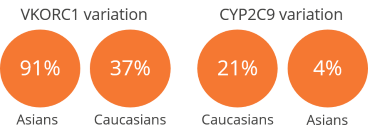 Warfarin is a leading cause of emergency hospitalization
Warfarin is a leading cause of emergency hospitalization
Personalized warfarin dosage can help you avoid emergency bleeding and hospitalizations
Most common reason for emergency hospitalization
Warfarin (coumarin), acenocoumarol and phenprocoumon are vitamin K antagonist (VKA) anticoagulants (blood thinners) used in patients with deep vein thrombosis, thromboembolism, cardiovascular or cerebrovascular risk, or after surgery. Warfarin is one of the most common reasons for emergency hospitalizations. Inaccurate dosing may lead to severe bleeding events.
Poor metabolizers of warfarin may be as high as 95% in the Asian population:
• Prevalence for VKORC1: 91% in Asians, 37% in Caucasians
• Prevalence for CYP2C9: 21% in Caucasians, 4% in Asians
Decrease risk of internal bleeding
In 2010, FDA recommended appropriate warfarin dosing for patients based on VKORC1 and CYP2C9 genotypes. The dosage of warfarin may be adjusted so as to arrive sooner at the normal blood concentration, achieve therapeutic benefits, and minimize severe bleeding and emergency hospitalizations. It is therefore critical to quickly and safely achieve the therapeutic concentrations for patients. Genotype-based warfarin dosing results in significant benefits.
Genetics of Warfarin metabolism, and FAQs
Warfarin (coumarin), acenocoumarol and phenprocoumon are vitamin K antagonist (VKA) anticoagulants (blood thinners) used for deep vein thrombosis, thromboembolism, cardiovascular or cerebrovascular risk, or after surgery.
Variations in genes that regulate the activity and metabolism of warfarin can cause adverse effects. The genes VKORC1 and CYP2C9 contribute to over 50% of this variation. VKORC1 is the target that is inhibited by warfarin. CYP2C9 is involved in warfarin metabolism. Variations in these genes lead to decreased expression and/or activity and hence high plasma drug concentrations which can be harmful because it increases the risk of severe bleeding.
The test categorizes individuals for warfarin metabolism by genotyping VKORC1 and CYP2C9 *2 and *3 using allele-specific real-time PCR. The method has almost 100% analytical accuracy and sensitivity. These two variants account for over 99% of the population prevalence for CYP2C9.

References
Johnson JA et al. 2011, Clinical Pharmacology and Therapeutics
Franchini M et al. 2014, Journal of Thrombosis and Haemostasis
